Outsourcing internal auditing: Empirical evidence from Vietnamese listed companies
Abstract
The internal audit activity can be organized internally or outsourced. Many companies
outsource their internal audit activities to outside service providers.There are several
benefits as well as drawbacks to outsourcing internal auditing. The purpose of this study is
to explore the realities and capabilities of outsourcing internal audit activities of listed
companies in Vietnam as one of the developing countries. The results of the study reveal
that a large proportion of Vietnamese listed companies has internal audit function and
adequate internal audit staff. These results may indicate to the increasing recognition of
the internal audit function by Vietnamese listed companies. However, internal audit
functions in many companies have not really effective. This study also give some
recommendations for enhancing outsourcing internal audit activities in Vietnamese listed
companies.
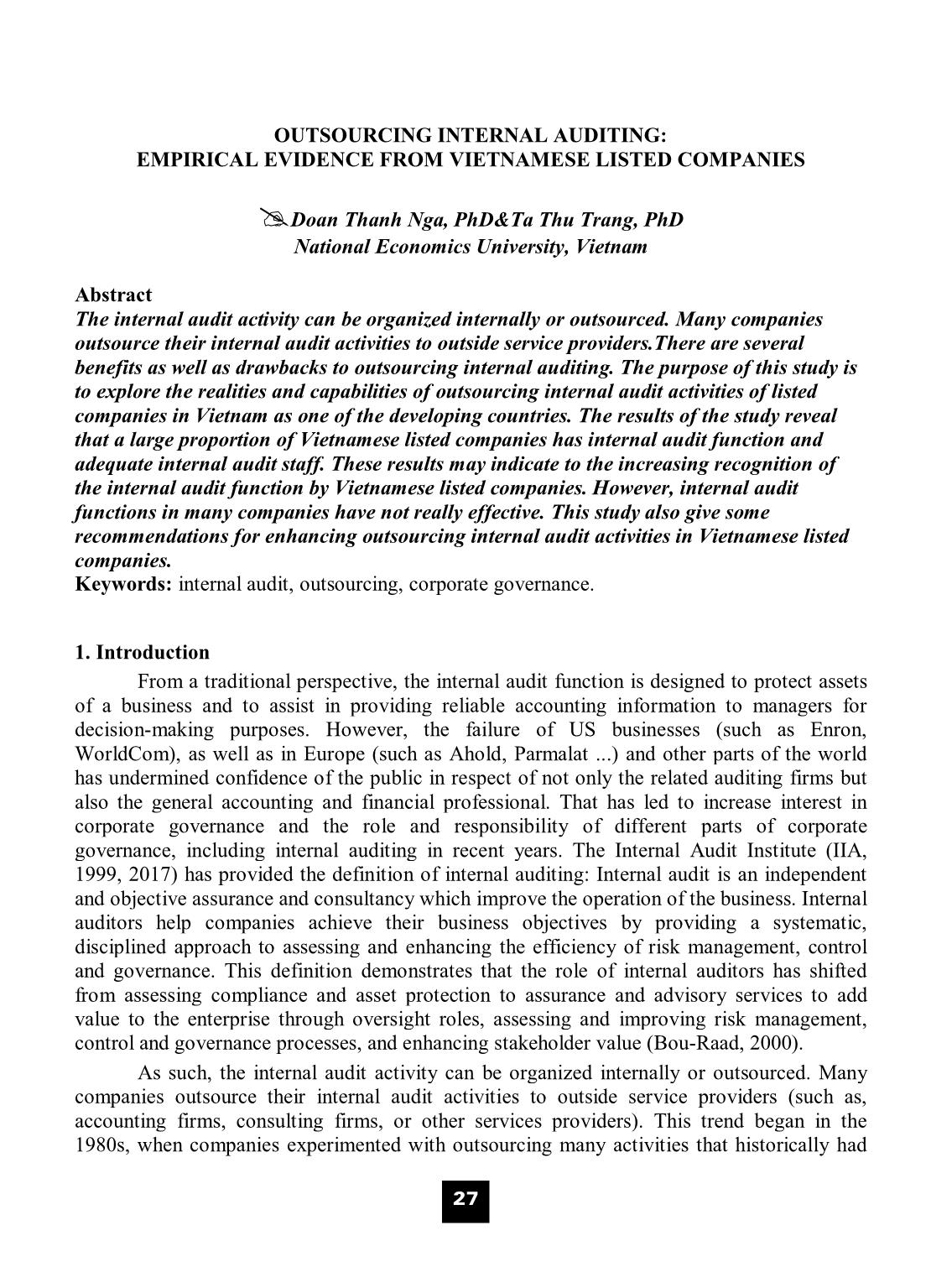
Trang 1
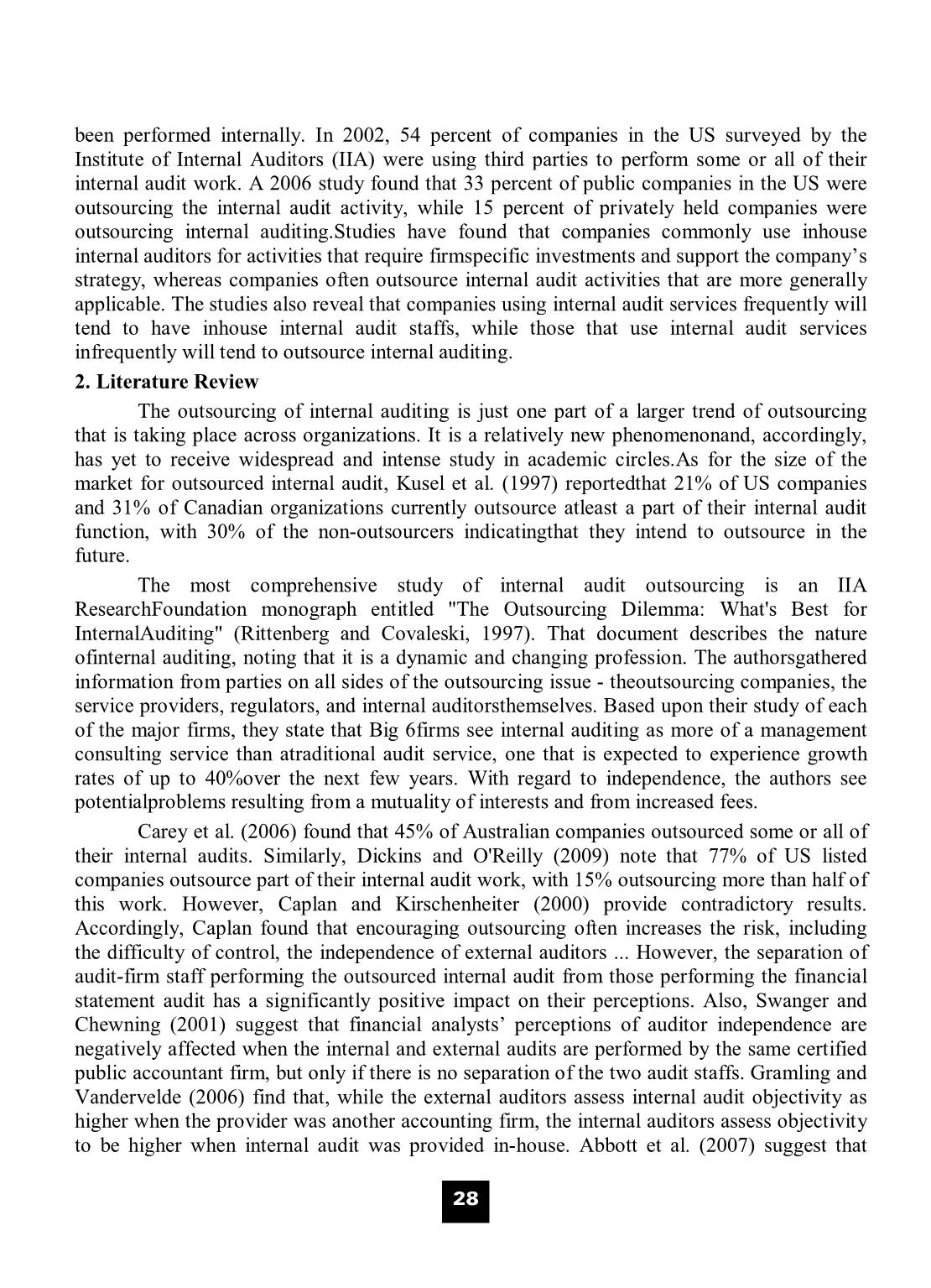
Trang 2
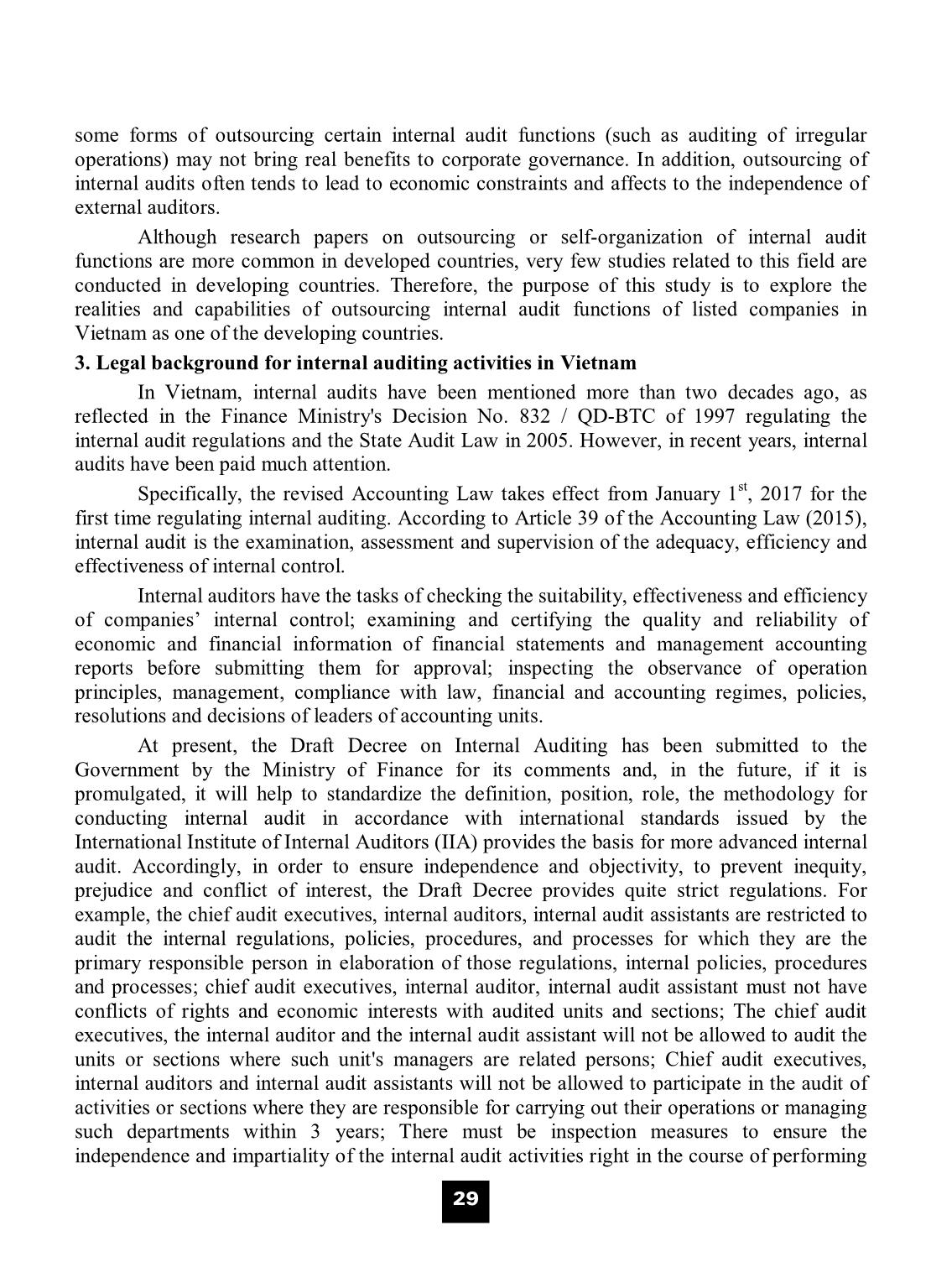
Trang 3
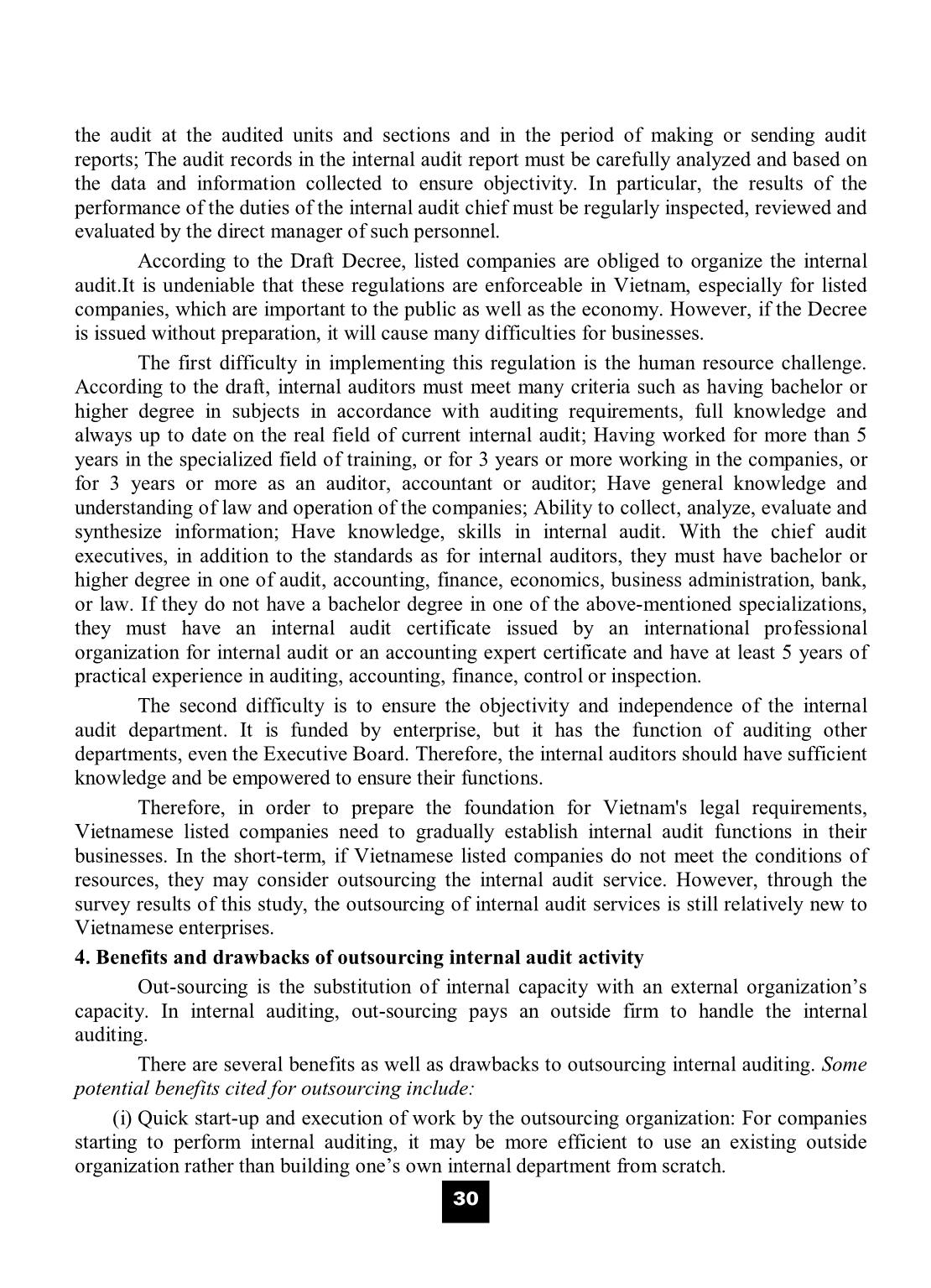
Trang 4
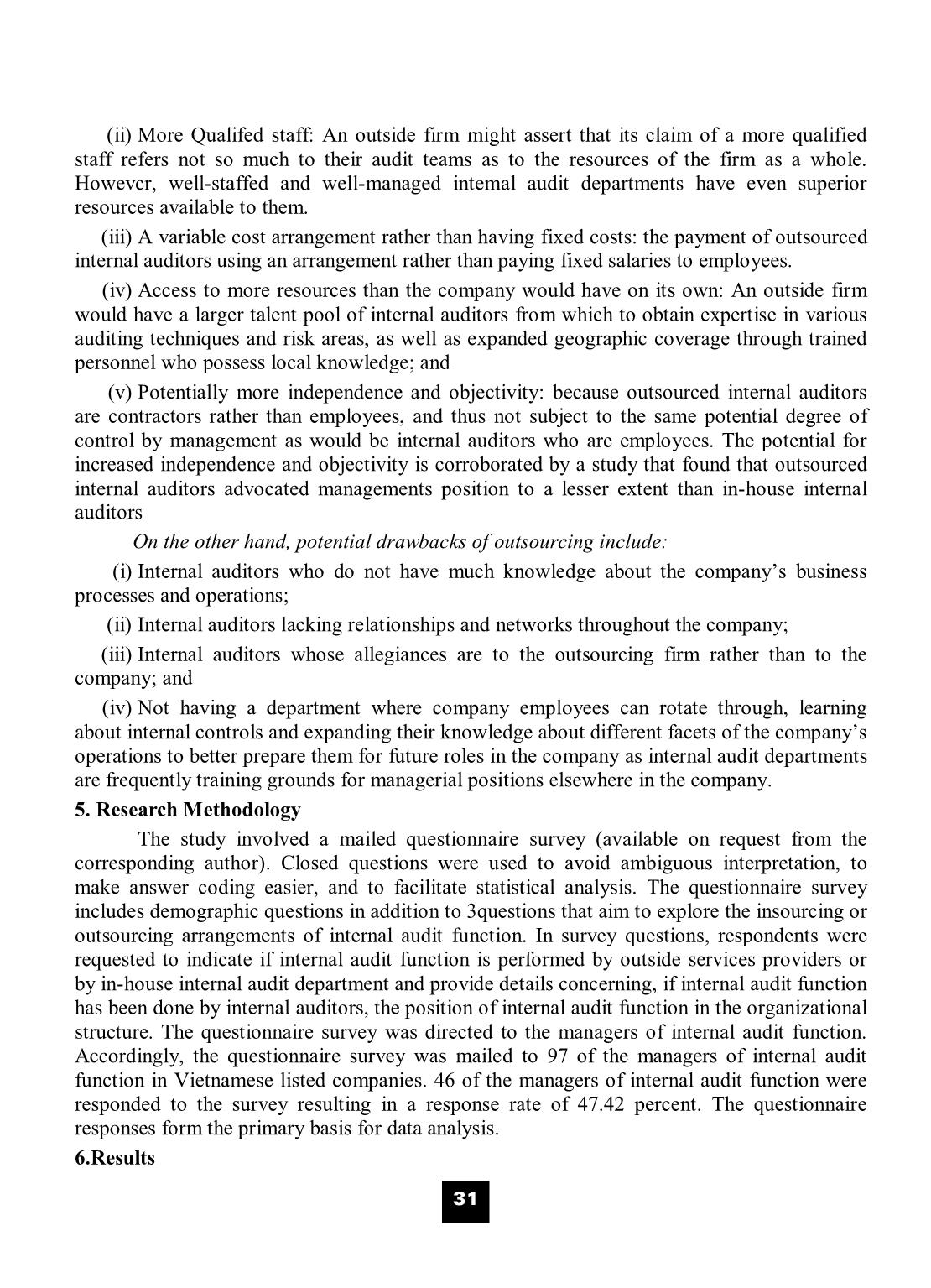
Trang 5
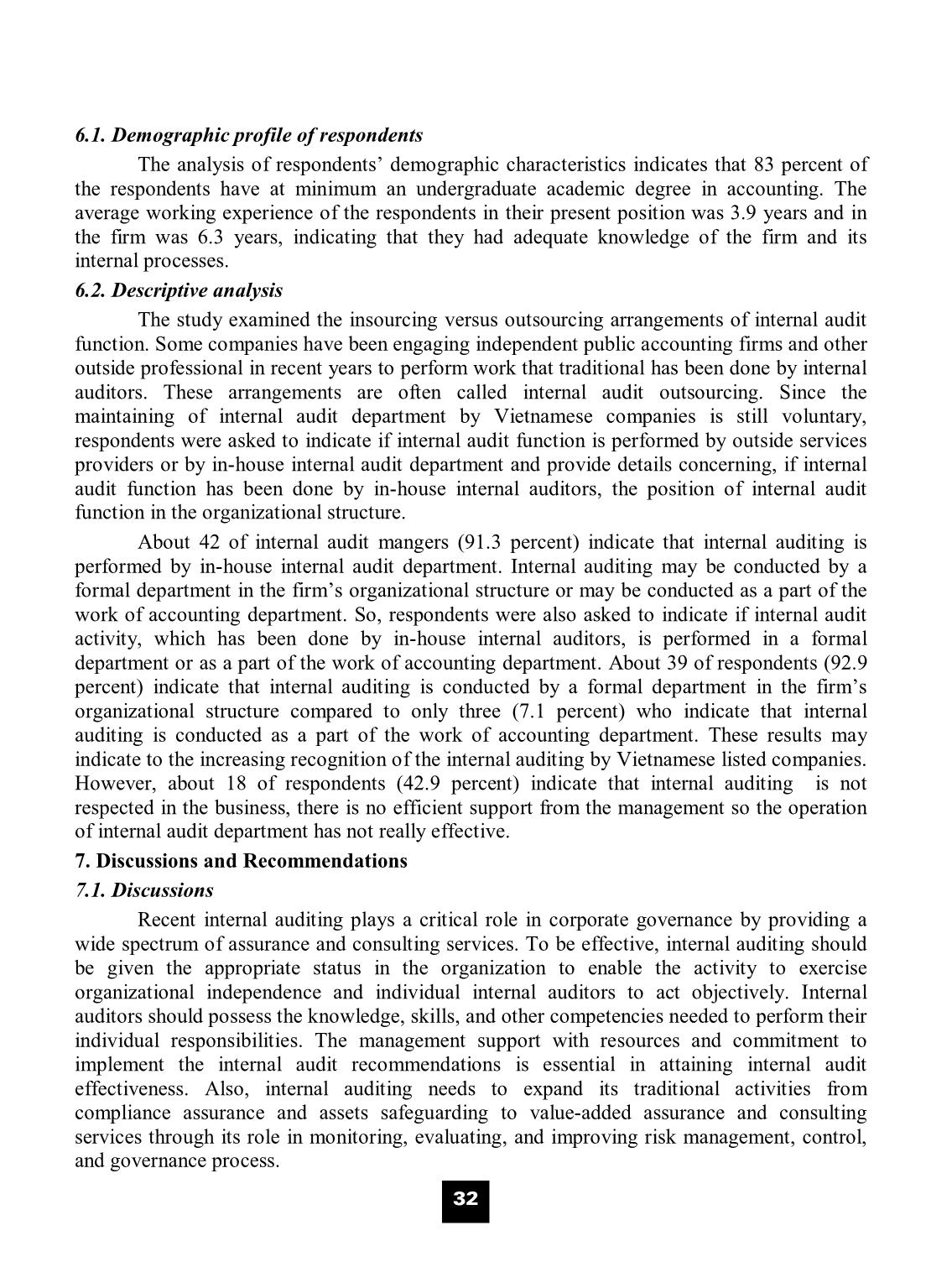
Trang 6
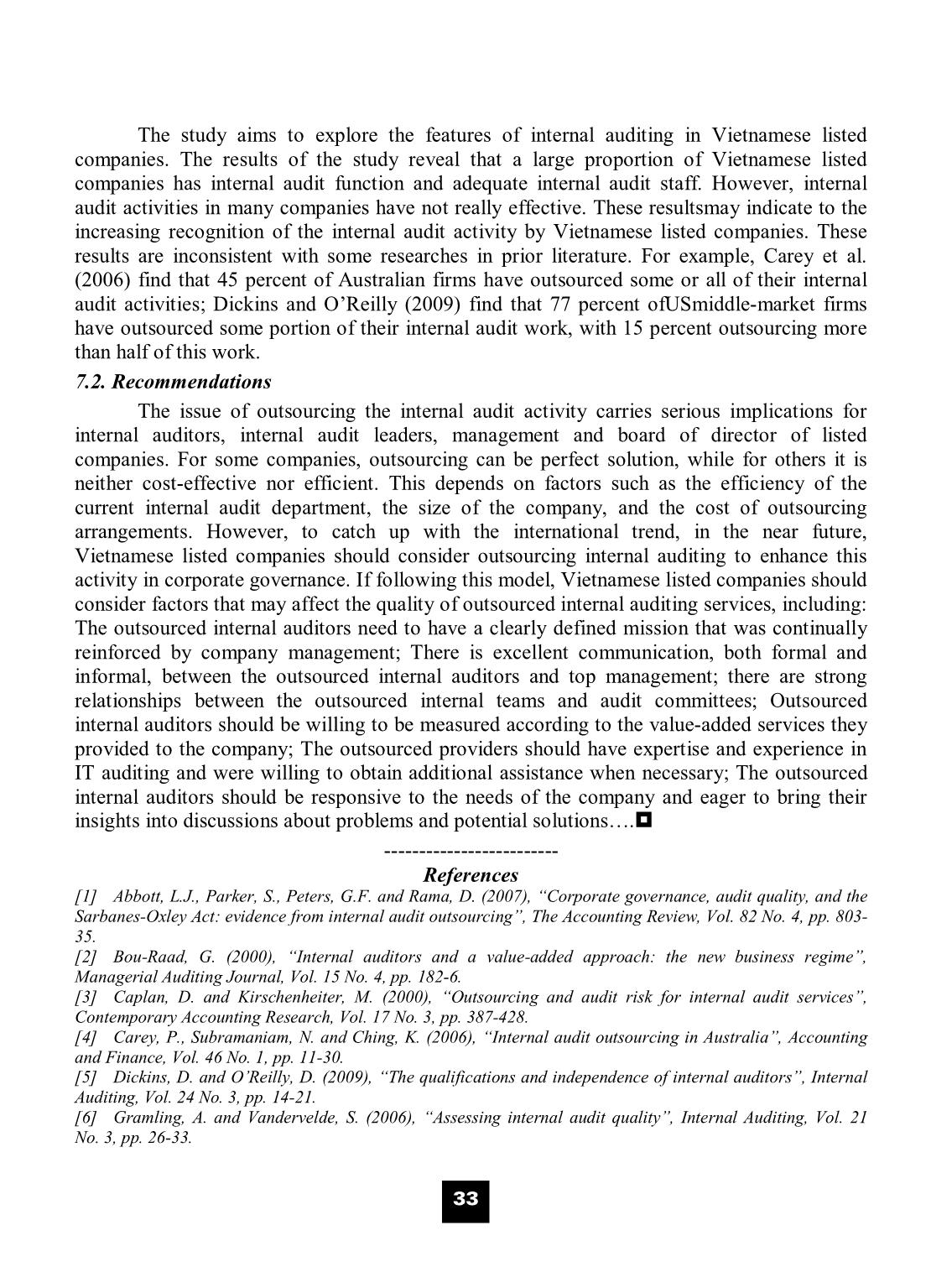
Trang 7
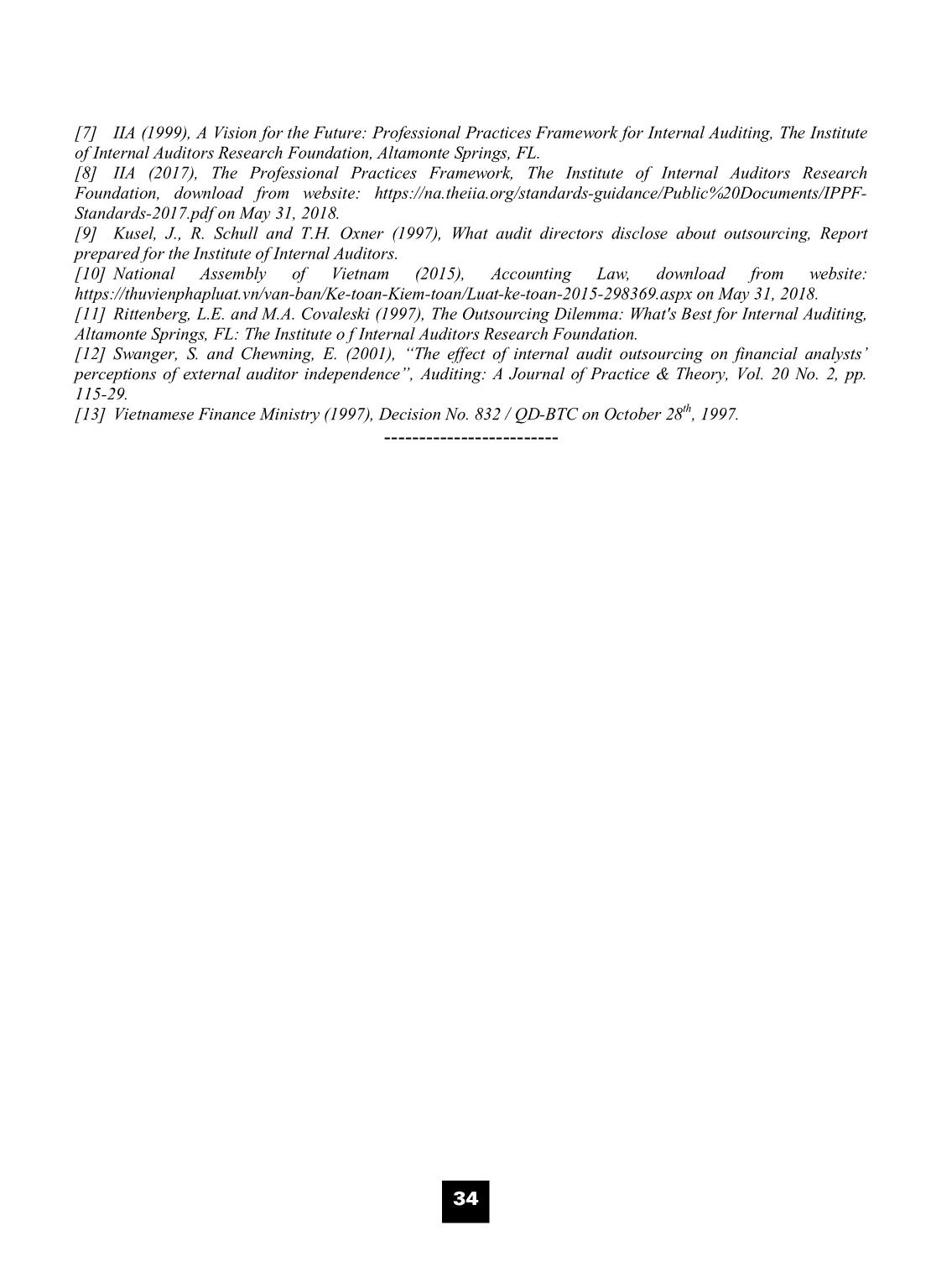
Trang 8
Tóm tắt nội dung tài liệu: Outsourcing internal auditing: Empirical evidence from Vietnamese listed companies
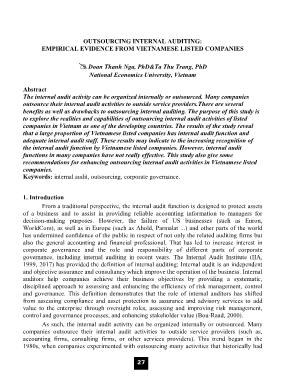
results of the performance of the duties of the internal audit chief must be regularly inspected, reviewed and evaluated by the direct manager of such personnel. According to the Draft Decree, listed companies are obliged to organize the internal audit.It is undeniable that these regulations are enforceable in Vietnam, especially for listed companies, which are important to the public as well as the economy. However, if the Decree is issued without preparation, it will cause many difficulties for businesses. The first difficulty in implementing this regulation is the human resource challenge. According to the draft, internal auditors must meet many criteria such as having bachelor or higher degree in subjects in accordance with auditing requirements, full knowledge and always up to date on the real field of current internal audit; Having worked for more than 5 years in the specialized field of training, or for 3 years or more working in the companies, or for 3 years or more as an auditor, accountant or auditor; Have general knowledge and understanding of law and operation of the companies; Ability to collect, analyze, evaluate and synthesize information; Have knowledge, skills in internal audit. With the chief audit executives, in addition to the standards as for internal auditors, they must have bachelor or higher degree in one of audit, accounting, finance, economics, business administration, bank, or law. If they do not have a bachelor degree in one of the above-mentioned specializations, they must have an internal audit certificate issued by an international professional organization for internal audit or an accounting expert certificate and have at least 5 years of practical experience in auditing, accounting, finance, control or inspection. The second difficulty is to ensure the objectivity and independence of the internal audit department. It is funded by enterprise, but it has the function of auditing other departments, even the Executive Board. Therefore, the internal auditors should have sufficient knowledge and be empowered to ensure their functions. Therefore, in order to prepare the foundation for Vietnam's legal requirements, Vietnamese listed companies need to gradually establish internal audit functions in their businesses. In the short-term, if Vietnamese listed companies do not meet the conditions of resources, they may consider outsourcing the internal audit service. However, through the survey results of this study, the outsourcing of internal audit services is still relatively new to Vietnamese enterprises. 4. Benefits and drawbacks of outsourcing internal audit activity Out-sourcing is the substitution of internal capacity with an external organization’s capacity. In internal auditing, out-sourcing pays an outside firm to handle the internal auditing. There are several benefits as well as drawbacks to outsourcing internal auditing. Some potential benefits cited for outsourcing include: (i) Quick start-up and execution of work by the outsourcing organization: For companies starting to perform internal auditing, it may be more efficient to use an existing outside organization rather than building one’s own internal department from scratch. n trÞ - Kinh nghiÖm quèc tÕ vµ thùc tr¹ng ë ViÖt Nam 31 (ii) More Qualifed staff: An outside firm might assert that its claim of a more qualified staff refers not so much to their audit teams as to the resources of the firm as a whole. Howevcr, well-staffed and well-managed intemal audit departments have even superior resources available to them. (iii) A variable cost arrangement rather than having fixed costs: the payment of outsourced internal auditors using an arrangement rather than paying fixed salaries to employees. (iv) Access to more resources than the company would have on its own: An outside firm would have a larger talent pool of internal auditors from which to obtain expertise in various auditing techniques and risk areas, as well as expanded geographic coverage through trained personnel who possess local knowledge; and (v) Potentially more independence and objectivity: because outsourced internal auditors are contractors rather than employees, and thus not subject to the same potential degree of control by management as would be internal auditors who are employees. The potential for increased independence and objectivity is corroborated by a study that found that outsourced internal auditors advocated managements position to a lesser extent than in-house internal auditors On the other hand, potential drawbacks of outsourcing include: (i) Internal auditors who do not have much knowledge about the company’s business processes and operations; (ii) Internal auditors lacking relationships and networks throughout the company; (iii) Internal auditors whose allegiances are to the outsourcing firm rather than to the company; and (iv) Not having a department where company employees can rotate through, learning about internal controls and expanding their knowledge about different facets of the company’s operations to better prepare them for future roles in the company as internal audit departments are frequently training grounds for managerial positions elsewhere in the company. 5. Research Methodology The study involved a mailed questionnaire survey (available on request from the corresponding author). Closed questions were used to avoid ambiguous interpretation, to make answer coding easier, and to facilitate statistical analysis. The questionnaire survey includes demographic questions in addition to 3questions that aim to explore the insourcing or outsourcing arrangements of internal audit function. In survey questions, respondents were requested to indicate if internal audit function is performed by outside services providers or by in-house internal audit department and provide details concerning, if internal audit function has been done by internal auditors, the position of internal audit function in the organizational structure. The questionnaire survey was directed to the managers of internal audit function. Accordingly, the questionnaire survey was mailed to 97 of the managers of internal audit function in Vietnamese listed companies. 46 of the managers of internal audit function were responded to the survey resulting in a response rate of 47.42 percent. The questionnaire responses form the primary basis for data analysis. 6.Results n trÞ - Kinh nghiÖm quèc tÕ vµ thùc tr¹ng ë ViÖt Nam 32 6.1. Demographic profile of respondents The analysis of respondents’ demographic characteristics indicates that 83 percent of the respondents have at minimum an undergraduate academic degree in accounting. The average working experience of the respondents in their present position was 3.9 years and in the firm was 6.3 years, indicating that they had adequate knowledge of the firm and its internal processes. 6.2. Descriptive analysis The study examined the insourcing versus outsourcing arrangements of internal audit function. Some companies have been engaging independent public accounting firms and other outside professional in recent years to perform work that traditional has been done by internal auditors. These arrangements are often called internal audit outsourcing. Since the maintaining of internal audit department by Vietnamese companies is still voluntary, respondents were asked to indicate if internal audit function is performed by outside services providers or by in-house internal audit department and provide details concerning, if internal audit function has been done by in-house internal auditors, the position of internal audit function in the organizational structure. About 42 of internal audit mangers (91.3 percent) indicate that internal auditing is performed by in-house internal audit department. Internal auditing may be conducted by a formal department in the firm’s organizational structure or may be conducted as a part of the work of accounting department. So, respondents were also asked to indicate if internal audit activity, which has been done by in-house internal auditors, is performed in a formal department or as a part of the work of accounting department. About 39 of respondents (92.9 percent) indicate that internal auditing is conducted by a formal department in the firm’s organizational structure compared to only three (7.1 percent) who indicate that internal auditing is conducted as a part of the work of accounting department. These results may indicate to the increasing recognition of the internal auditing by Vietnamese listed companies. However, about 18 of respondents (42.9 percent) indicate that internal auditing is not respected in the business, there is no efficient support from the management so the operation of internal audit department has not really effective. 7. Discussions and Recommendations 7.1. Discussions Recent internal auditing plays a critical role in corporate governance by providing a wide spectrum of assurance and consulting services. To be effective, internal auditing should be given the appropriate status in the organization to enable the activity to exercise organizational independence and individual internal auditors to act objectively. Internal auditors should possess the knowledge, skills, and other competencies needed to perform their individual responsibilities. The management support with resources and commitment to implement the internal audit recommendations is essential in attaining internal audit effectiveness. Also, internal auditing needs to expand its traditional activities from compliance assurance and assets safeguarding to value-added assurance and consulting services through its role in monitoring, evaluating, and improving risk management, control, and governance process. n trÞ - Kinh nghiÖm quèc tÕ vµ thùc tr¹ng ë ViÖt Nam 33 The study aims to explore the features of internal auditing in Vietnamese listed companies. The results of the study reveal that a large proportion of Vietnamese listed companies has internal audit function and adequate internal audit staff. However, internal audit activities in many companies have not really effective. These resultsmay indicate to the increasing recognition of the internal audit activity by Vietnamese listed companies. These results are inconsistent with some researches in prior literature. For example, Carey et al. (2006) find that 45 percent of Australian firms have outsourced some or all of their internal audit activities; Dickins and O’Reilly (2009) find that 77 percent ofUSmiddle-market firms have outsourced some portion of their internal audit work, with 15 percent outsourcing more than half of this work. 7.2. Recommendations The issue of outsourcing the internal audit activity carries serious implications for internal auditors, internal audit leaders, management and board of director of listed companies. For some companies, outsourcing can be perfect solution, while for others it is neither cost-effective nor efficient. This depends on factors such as the efficiency of the current internal audit department, the size of the company, and the cost of outsourcing arrangements. However, to catch up with the international trend, in the near future, Vietnamese listed companies should consider outsourcing internal auditing to enhance this activity in corporate governance. If following this model, Vietnamese listed companies should consider factors that may affect the quality of outsourced internal auditing services, including: The outsourced internal auditors need to have a clearly defined mission that was continually reinforced by company management; There is excellent communication, both formal and informal, between the outsourced internal auditors and top management; there are strong relationships between the outsourced internal teams and audit committees; Outsourced internal auditors should be willing to be measured according to the value-added services they provided to the company; The outsourced providers should have expertise and experience in IT auditing and were willing to obtain additional assistance when necessary; The outsourced internal auditors should be responsive to the needs of the company and eager to bring their insights into discussions about problems and potential solutions. ------------------------- References [1] Abbott, L.J., Parker, S., Peters, G.F. and Rama, D. (2007), “Corporate governance, audit quality, and the Sarbanes-Oxley Act: evidence from internal audit outsourcing”, The Accounting Review, Vol. 82 No. 4, pp. 803- 35. [2] Bou-Raad, G. (2000), “Internal auditors and a value-added approach: the new business regime”, Managerial Auditing Journal, Vol. 15 No. 4, pp. 182-6. [3] Caplan, D. and Kirschenheiter, M. (2000), “Outsourcing and audit risk for internal audit services”, Contemporary Accounting Research, Vol. 17 No. 3, pp. 387-428. [4] Carey, P., Subramaniam, N. and Ching, K. (2006), “Internal audit outsourcing in Australia”, Accounting and Finance, Vol. 46 No. 1, pp. 11-30. [5] Dickins, D. and O’Reilly, D. (2009), “The qualifications and independence of internal auditors”, Internal Auditing, Vol. 24 No. 3, pp. 14-21. [6] Gramling, A. and Vandervelde, S. (2006), “Assessing internal audit quality”, Internal Auditing, Vol. 21 No. 3, pp. 26-33. n trÞ - Kinh nghiÖm quèc tÕ vµ thùc tr¹ng ë ViÖt Nam 34 [7] IIA (1999), A Vision for the Future: Professional Practices Framework for Internal Auditing, The Institute of Internal Auditors Research Foundation, Altamonte Springs, FL. [8] IIA (2017), The Professional Practices Framework, The Institute of Internal Auditors Research Foundation, download from website: https://na.theiia.org/standards-guidance/Public%20Documents/IPPF- Standards-2017.pdf on May 31, 2018. [9] Kusel, J., R. Schull and T.H. Oxner (1997), What audit directors disclose about outsourcing, Report prepared for the Institute of Internal Auditors. [10] National Assembly of Vietnam (2015), Accounting Law, download from website: https://thuvienphapluat.vn/van-ban/Ke-toan-Kiem-toan/Luat-ke-toan-2015-298369.aspx on May 31, 2018. [11] Rittenberg, L.E. and M.A. Covaleski (1997), The Outsourcing Dilemma: What's Best for Internal Auditing, Altamonte Springs, FL: The Institute o f Internal Auditors Research Foundation. [12] Swanger, S. and Chewning, E. (2001), “The effect of internal audit outsourcing on financial analysts’ perceptions of external auditor independence”, Auditing: A Journal of Practice & Theory, Vol. 20 No. 2, pp. 115-29. [13] Vietnamese Finance Ministry (1997), Decision No. 832 / QD-BTC on October 28th, 1997. -------------------------
File đính kèm:
 outsourcing_internal_auditing_empirical_evidence_from_vietna.pdf
outsourcing_internal_auditing_empirical_evidence_from_vietna.pdf

